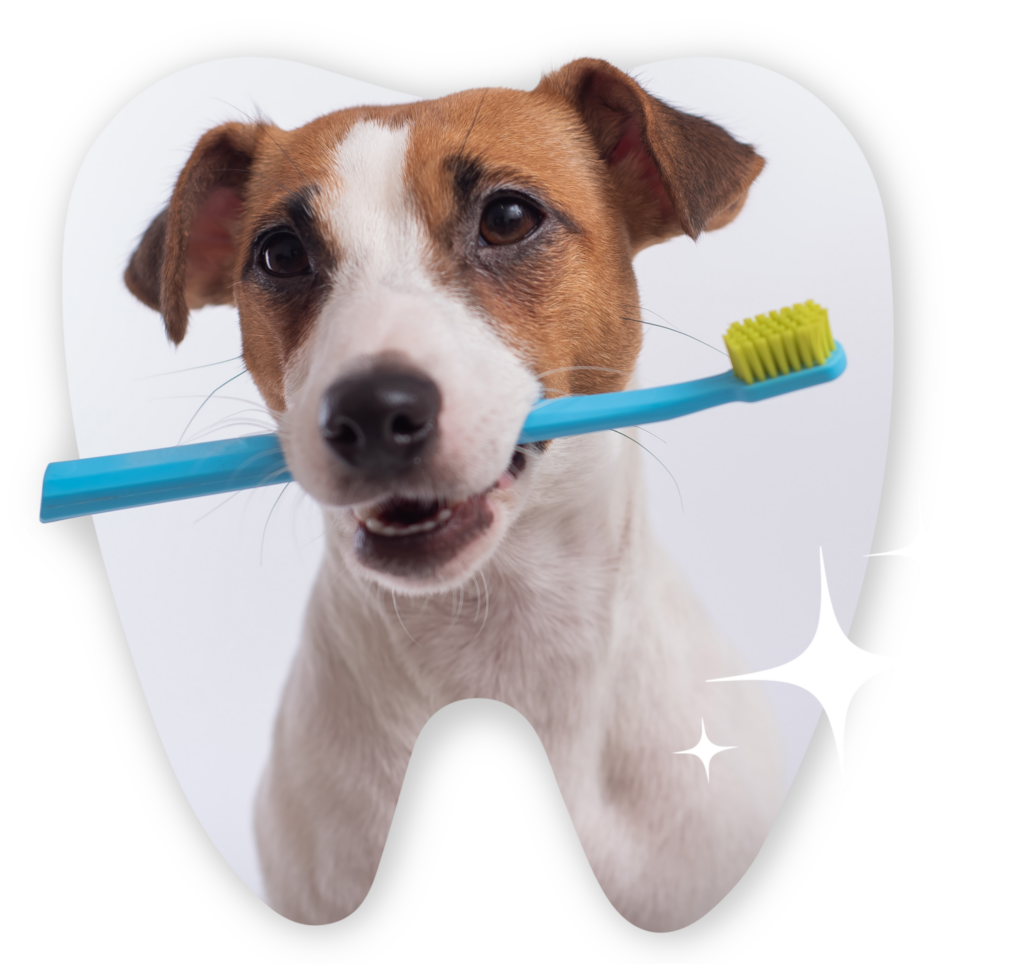Dental Days Deal
$100 off Dental Cleanings
For new and existing clients!
Call (713) 526-5881 to schedule a cleaning today!

January 15 – March 15 2025
*New and existing clients. Canine and feline only. Not valid with other offers. Not redeemable for cash.May use offer on multiple pets within the same household. Not applicable for membership or wellness plans.
We recommend your pet having a full dental examination and cleaning at least
ONCE A YEAR.
Proper dental care is an important part of your pet’s overall health and wellness. Unfortunately, it is often overlooked or not prioritized by pet parents. According to the American Veterinary Dental Society, 80% of dogs and 70% of cats show signs of dental disease by the age of three.
Common signs of dental disease include bad breath and oral infections, both of which are easily preventable with consistent home care and routine professional examinations.
Signs your pet needs dental care
Some signs and symptoms your pet needs a dental cleaning are easily visible, while others may need to be diagnosed by a medical professional. Our veterinarians recommend a full dental exam on a yearly basis so they can treat the dental disease before it progresses.
Here are some signs your pet may be showing at home indicating they need professional dental care:
Bad breath
Broken, loose, or missing teeth
Discoloration or tartar buildup
Excessive chewing or drooling
Reduced appetite or inability to chew
Swelling or bleeding in or around the mouth

Common pet dental care questions
SUNSET’S PET DENTAL CARE PROCEDURE:
Your pet’s overall health is our number one priority. Dental cleanings are an in-depth medical procedure. Our comprehensive dentistry service is available for both dogs and cats. The following steps are performed during your pet’s dental cleaning:
- Full physical and oral examination
- Digital radiographs (optional)
- Professional cleaning
- Calculus removal
- Sub-gingival scaling, root planning and curettage
- Full medical record keeping and charting
- Teeth polishing
- Irrigation
- Post-cleaning examination
- Detailed instructions for post-cleaning home care
- Post-procedural pain or antibiotic medications (if needed)
We also carry a variety of products to help you with providing your pet the recommended routine dental care at home. Our products include pet toothbrushes and toothpaste, dental chews, rinses, and special diets.
A full series of dental radiographs (x-rays) are recommended while your pet is undergoing their dental cleaning. These x-rays allow our veterinarians to visualize the area beneath the gum line as well as the structure of the teeth and bones. By performing full-mouth radiographs, we can more accurately diagnose common diseases as it allows us to see where the other 75% of the tooth structure lies. Radiographs allow our veterinarians to diagnose and further treat periodontal disease, tooth resorption, impacted teeth, retained roots or tooth fragments, dead teeth, broken tooth roots, and abscesses. Studies show that dental disease is misdiagnosed 70% of the time when full x-rays are not performed.
We recommend for your cat or dog to receive their first set of full dental radiographs around the age of six months. It can be performed in conjunction with their spay or neuter procedure, or during their first dental cleaning. Follow-up radiographs are recommended on a pet-by-pet basis depending on their diagnosis and treatment.
Dental care is in important part of your pet’s overall health and wellness. While frequently overlooked, dental disease is the most common problem in dogs and cats. Most animals have at least one painful tooth or other symptoms and are unable to communicate their needs. A pet with bad breath is not normal and is actually a sign of a serious oral infection.
Regular at-home care can prevent beginning stages of dental disease, but cannot treat more progressive infections or other issues, such as broken teeth. More serious dental disease and infections can ultimately affect other body systems, including the heart, lungs, liver, and kidneys.
Annual professional dental examinations and cleanings in addition to appropriate dental care at home are necessary to keep your pets happy, healthy, and comfortable.
You, in addition to your pet’s veterinarian, play a vital role in your pet’s health. While our veterinarians can diagnose, treat, and prescribe care for your pet, it is important for our recommendations to be carried out at home. Consistent, attentive, and effective home care, especially when it comes to dental cleaning, is imperative to preventing the onset of illnesses or diseases in your pet.
Immediately following a dental cleaning, bacterial plaque can be present in your dog or cat’s mouth in as little as three hours. The development of bacteria and plaque causes an inflammatory response in the gums (gingivitis), ultimately leading to more developed dental disease. With consistent care at home, such as tooth brushing, oral rinses, and dental-specific diets and treats, you can help contribute to preventing dental disease in your pet.
The following are precise breakdowns of how exactly you can care for your pet’s dental health at home.
TOOTH BRUSHING
- This is both the most effective and the least expensive at-home method.
- Ideally, you should brush your pet’s teeth twice a day, but once daily is effective.
- It is recommended to start your pet young so they can become familiar. Even if your pet is an adult, they can be trained to accept brushing.
- Tips: Start slow. Remain calm. Train them gradually. Begin by rubbing their gums with your finger before introducing the toothbrush. Give treats throughout. Eventually, you can add a finger brush, and then introduce a soft bristled brush when your pet is ready.
ORAL RINSES
- Oral rinses act as an antiseptic action against bacteria.
- Rinses are only moderately effective when compared alone to brushing.
- Combining rinses with brushing is more effective than doing one or the other.
- We recommend applying the rinse once daily after feeding by squirting a small amount inside the cheek on each side of the mouth.
DENTAL DIETS
- Implementing a dental diet is the most convenient at-home method.
- We recommend Hill’s Prescription Diet T/D, which is specially designed to reduce plaque as your pet chews.
DENTAL-FRIENDLY CHEWS
- Dental chews are another convenient way to both treat dental disease and entertain your dog at home.
- Be sure to choose a chew that is hard enough to help reduce plaque but not so hard that it damages your pet’s teeth.
- Tip: Choose a chew that will indent if you put pressure with your thumb and can be bent to a 90-degree angle without breaking.
- We recommend CET Chews and Greenies.
SANOS VETERINARY DENTAL SEALANT
- Dental sealant is an effective treatment in helping to prevent bacteria from getting under the gums.
- This must be applied initially at the time of the dental cleaning, and it is designed to be effective for up to six months.
For additional recommendations and information on dental products for at-home care, visit the Veterinary Oral Health Council website at www.VOHC.com.
General anesthesia is absolutely necessary for a safe and effective dental cleaning procedure. While there are risks involved with the use of anesthesia, most complications can be avoided with consistent monitoring and an excellent level of patient care. At Sunset Animal Hospital, our veterinarians and support staff take anesthesia safety very seriously. We are dedicated to providing the best and safest medical care for your pet. Our facility is equipped with the most modern and safest medications, protocols, and equipment.
Our team monitors the anesthetic depth of your pet closely and constantly throughout the procedure on a physical level and with the latest monitoring equipment. We make sure to only use the amount that is needed, which is usually less in dental procedures than in spay or neuter surgeries. While there may be an anesthetic risk, prolonged and untreated dental disease poses a bigger threat to your pet than well-monitored and properly supported general anesthesia.


